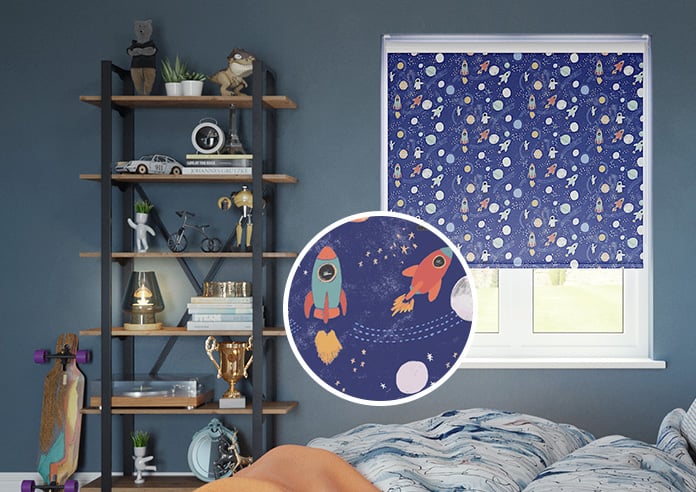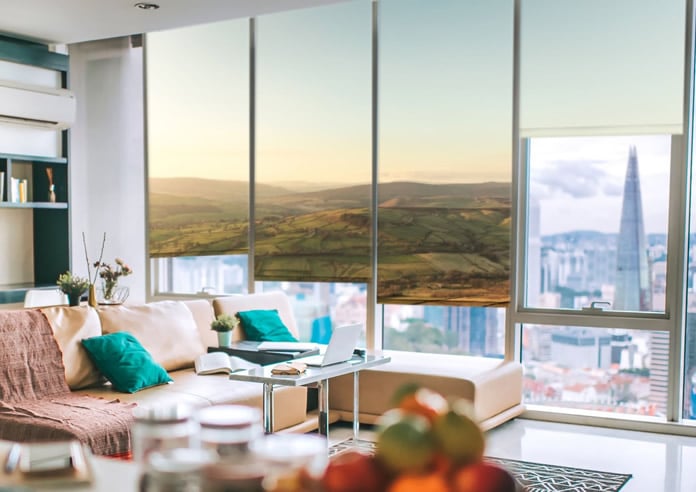Which country is the most well-rested | 247 Blog
TIPS
Posted 13/07/2022
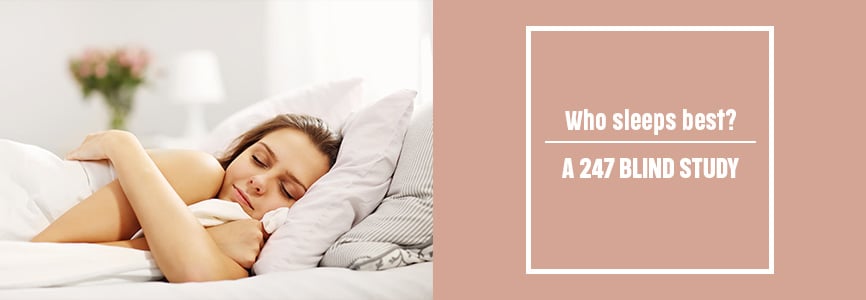
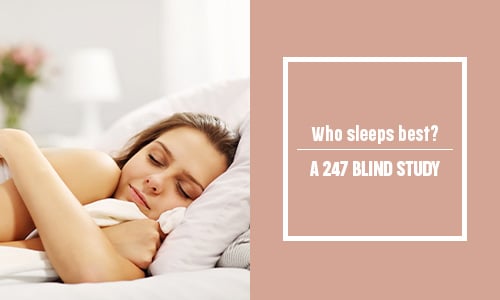
Tossing and Turning? Our Global Sleep index reveals which countries are the most well-rested
Let’s take a deep dive into one of the most integral parts of our everyday lives: sleep. In an ideal world, we’d all love to have a balanced, snooze-filled sleep routine that leaves us feeling refreshed and ready to smash our day-to-day, but that isn’t always the case. All around the world, there are countless factors that can wreak havoc with your sleep routine. From pressing responsibilities and work stress to uncomfortable temperatures and surroundings, sometimes a good night’s sleep can seem elusive - no matter what country you’re from. The question is, how does the UK compare to other countries when it comes to our sleeping habits?
To gain a deeper understanding of which countries are sleeping soundly across the globe, as opposed to those who are tossing and turning, the team here at 247 Blinds have used a variety of data sources to find out which countries get the most sleep, based on factors such as screen time usage and google searches for sleep remedies. From afternoon siestas to getting a full eight hours of beauty sleep, which countries are the most well-rested across the globe? Let’s find out.
Which countries are getting the best night's sleep?
Whether you’re north or south, east or west, every corner of the globe varies in climate, conditions and culture - all of which can play a significant role in your sleeping pattern. From hot and humid climates to colder, less-populated places, this map is a visual representation of which countries are the most well-rested and the least well-rested in the world.
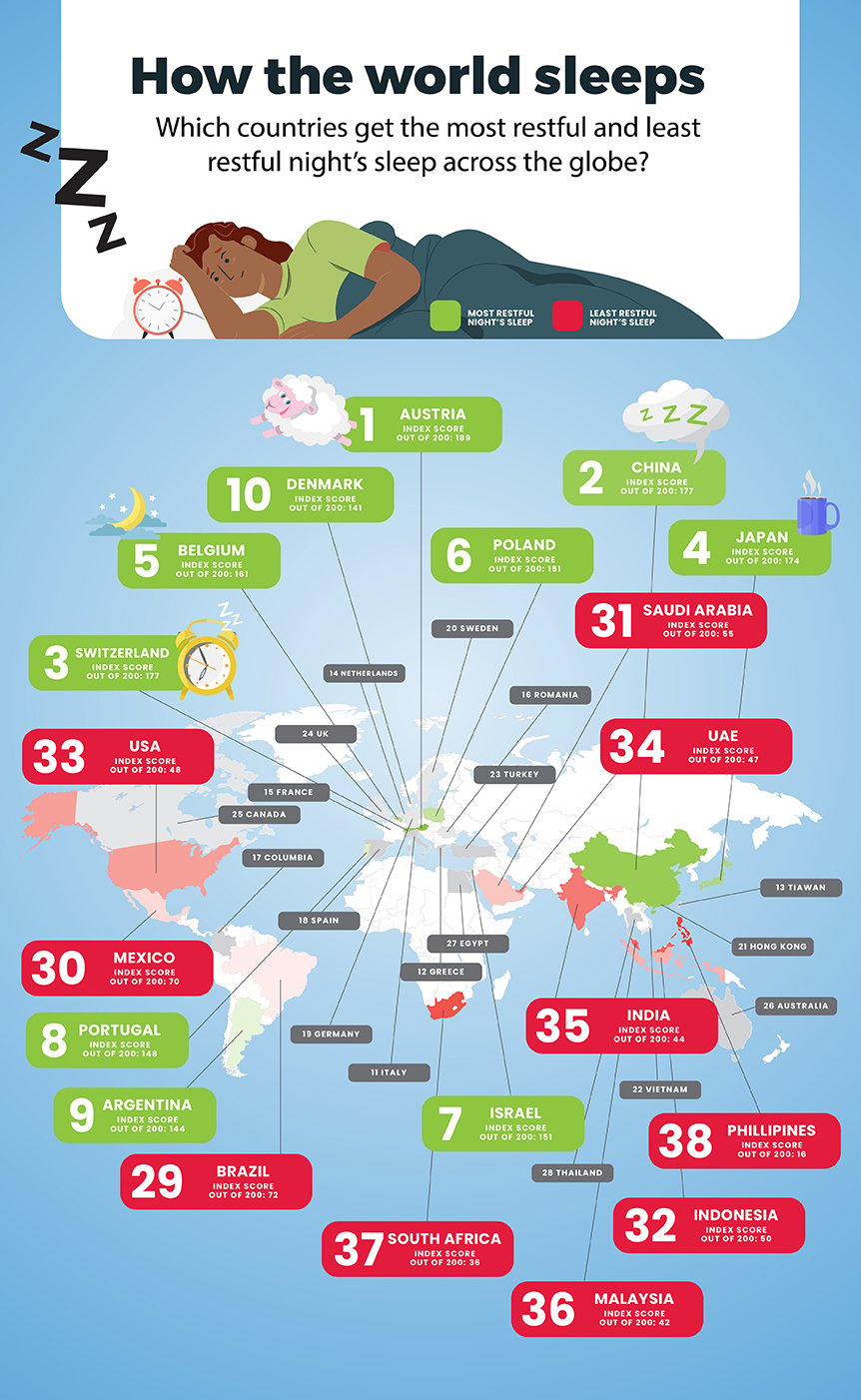

In the top spot for the most well-rested country, we have Austria – where the hills are alive with the sound of snoozing, it seems. Closely followed by China and Switzerland, the alp studded Austria, which has four very distinct seasons, came out as number one.
Interestingly, the least well-rested country is the beautiful Brazil. This hot and humid country doesn’t see much temperature variation from season to season - meaning it maintains sunny skies all year round. With Mexico and sunny Saudi Arabia coming in hot after Brazil, results suggest that warmer conditions result in less rest.
Who’s searching for solutions?
With the modern world playing a part in most aspects of our every day, sleep is no exception: from searching for sleep remedies to scrolling through to the early hours, technology can have a big impact on our quality of rest. To further understand what factors contribute to poor sleeping patterns across the globe, we looked into how much time people are spending on devices in different countries, as well as which countries search Google the most for sleep remedies.
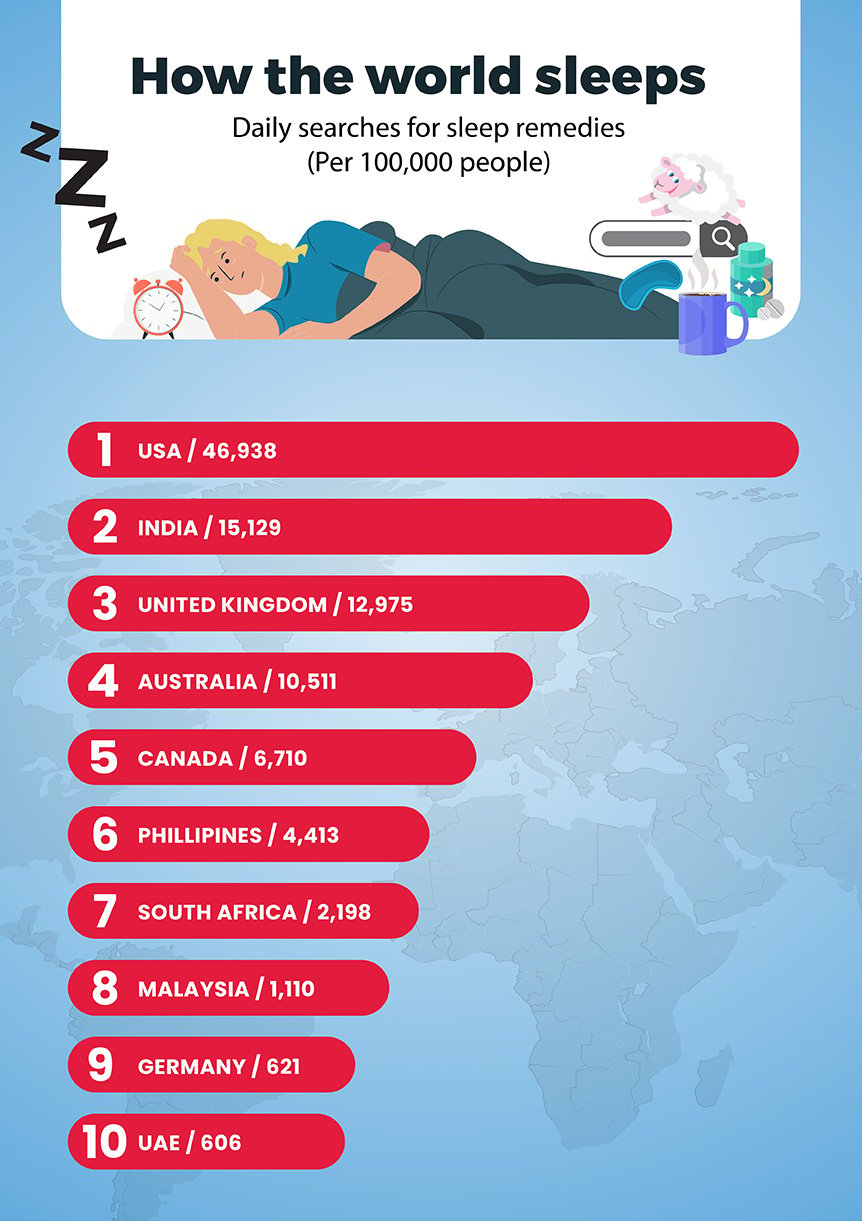

According to our findings, the country that spends the highest amount of daily time on devices, such as phones, iPads and laptops, is South Africa. With South Africa also placing third place for spending the most time on social media, it’s no surprise that this culturally diverse destination is the most screen-dependent.
America is the country that searches the most for sleep solutions, with the UK not far behind in fifth place. As America came fifth in the least well-rested country category, it’s no wonder that the USA is turning to Google for tips. Sure, they may have the ‘American Dream’ in theory, but sweet dreams and deep sleep is something they seem to struggle with…
Interestingly, the fourth most well-rested country, Japan, proved to also be the country that spent the lowest amount of daily time on devices, as well as the least amount of time on social media. Maybe sushi and socials don’t go hand in hand? One thing’s for certain, however, less screen time means better sleep.
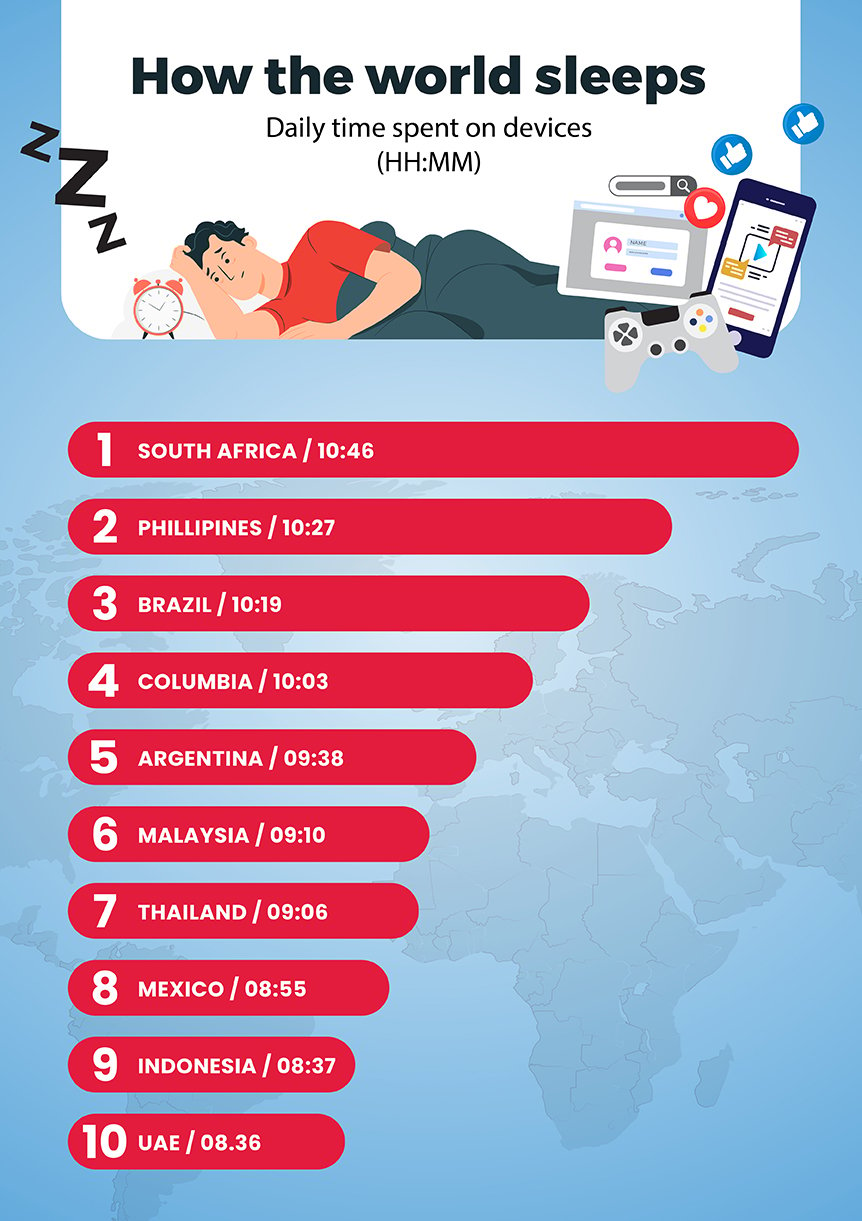

Top tips for sleep
Nailing a faultless sleeping routine doesn’t happen, well, overnight. To help you press snooze and increase the amount of deep sleep you get each evening, we’ve pulled together some expert-led top tips to help you relax and reset…
1. Relax with a bedtime routine
Whether you’ve had a hectic day at work, a jam packed childcare afternoon or simply have a lot going on, stress from a busy day can leak into your evening and make it difficult to switch off your mind for sleep. Spending time creating a personalised bedtime routine will help set you up for a successful next day.
Try and take the hour before bedtime as an opportunity to wind down - from washing your face to putting on some fresh bedsheets, do whatever you need to do to feel relaxed and refreshed. We recommend the following:
— Have a hot bath or a shower
— Read some of your book before bed
— Minimise your morning routine by doing the following before bed: pick out your outfit for the next day, pre-prepare your breakfast, pack your bag for the next day etc
— Unwind with calming music
— Avoid stimulants such as caffeine and alcohol during the evening
2. Be mindful of light
From exposure to outdoor light to too much time subjected to blue light, there are a number of different ways light can have an effect on your quality of rest. Our bodies have a natural time-keeping clock known as our Circadian rhythm - Dr Deborah Lee, from Dr Fox Online Pharmacy [1] , explains:
“Blue light is essential for our Circadian rhythms because in the mornings and during the day, the detection of blue light switches off melatonin production, and stops us from feeling sleepy – keeping us awake. However, excess blue light does have harmful effects on our Circadian rhythms, depending on the source.”
“In the evenings, avoid looking at any blue-light-emitting devices 2-3 hours before bedtime. Dim the lights and use blackout blinds or curtains. Blackout blinds block out blue light, but they also help reduce noise, and provide a form of heat insulation, and against pollution.”
“When you wake up, open the curtain and blinds fully to flood the room with natural light. For best results, the brain needs to be fully aware of the difference between night and day.”
If you’re sharing your room with a partner who has a different routine to you, we’d also recommend a sleeping mask to help prolong your morning snooze.
3. Tailor the temperature
Depending on where in the world you are, the temperature can have a negative effect on your sleeping routine. Whether you’re too hot and sweaty or shivering from cold conditions, making sure your bedroom environment is the right temperature for you will see your sleep pattern improve.
Amy Wilson, interior designer at 247 Blinds, provides her expert opinion on the best window treatments for different temperatures:
“If you’re trying to sleep during a hot spell, the direction your room is facing will make a huge difference - a south facing room will have the most sunshine, whereas north-facing by contrast are likely to remain cooler. Consider Roman blinds with blackout lining for keeping the room cool in the early evening ahead of you going to bed. Drop your blinds during the hottest part of the day around lunchtime to prevent the room from heating up too much. Wooden blinds and shutters are also a great option for diffusing the harshest of the sun’s rays, sunlight, but still allow light in if tilted down or up at a slight angle. For the colder months, consider layering curtains in front of your Wooden Venetian blinds or shutters to retain the heat and prevent any draughts. The curtains can be drawn in front of the blinds for added drama."
4. Build your own sleep sanctuary
Though it’s called a bedroom, there’s an awful lot more to a good night’s sleep in your bedroom than your ‘bed’ frame alone. After all, there’s a reason people tend to sleep better in plush hotels - a comfortable mattress, enough plumage and relaxing scents all play their part.
Never underestimate the importance of a plush pillow and a snuggly blanket. Using high-quality materials in your bedroom is sure to pay off in the long run. Everything from bed high thread count sheets, to low-light lamps and relaxing lavender scents, will help you create a sleeping sanctuary to suit you. Amy Wilson, interior designer for 247 Blinds and a former contestant on BBC's Interior Design Masters, advises:
'To encourage a calm atmosphere in your sleeping space, I'd advise creating a real sanctuary of your bedroom through your choice of colour scheme, lighting and window dressings. If you're struggling to relax during the nighttime and want to sleep soundly, I would suggest opting for a more limited colour palette - this could be a dark, cocooning all blue scheme incorporating deep inky blues and navy. Alternatively, opt for a more neutral colours scheme using milky whites and putty tones that evoke calm and restfulness."
We would also recommend investing in a mattress that suits your needs. From memory foam to pocket spring, testing out different types of mattresses to find the one that works best for you could have a real impact on your sleeping routine.
Full data findings can be found below.
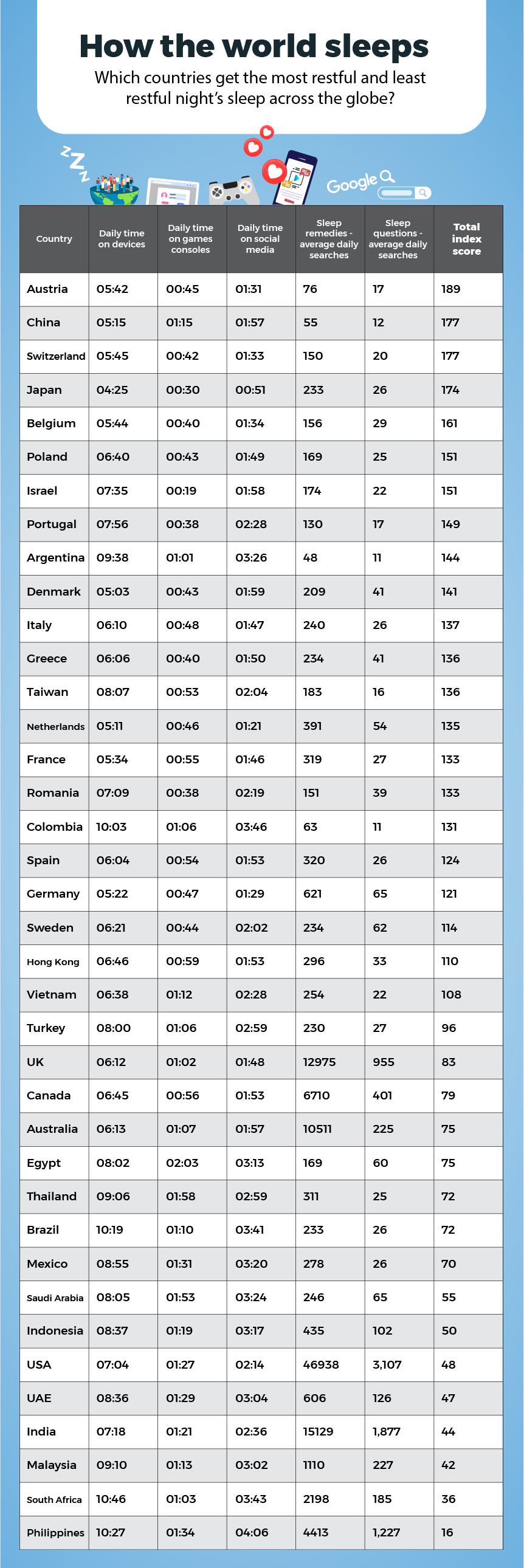

Methodology
To reveal ‘the most and least rested countries in the world’ we looked at three main data points. The first indexing factor was the total time spent on devices - including time spent on social media, using game consoles and overall screen time.
This data was collected using Comparitech’s screen time statistics and ranked from highest to lowest. The next factor researched was searches for sleep remedies - investigating potential ‘hacks’ that people were searching for - indicating a need for sleep aids.
We also looked at search volumes for sleep terms such as ‘how to sleep faster’ and collected the total populations of all countries in order to standardise the data by capita.
The different metrics were then given an index score out of 200 - with a higher score meaning that a country is more well-rested and 0 being the lowest. Some countries were not included due to gaps in data.
Sources:




 Track My Order
Track My Order
 My Account
My Account
 Wishlist
Wishlist
 Call now
Call now
